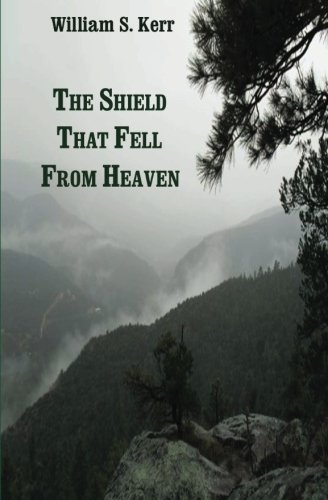 William S. Kerr’s first novel, The Shield that Fell from Heaven, is a delightful surprise. It is not a book I would have expected to find from such a small publisher, Groton Jemez Publishing, and it is not a book I would have expected to find in this century. Indeed, had I been told it was written in the 19th, I would have believed it, at least until I came to a more modern science fiction element.
William S. Kerr’s first novel, The Shield that Fell from Heaven, is a delightful surprise. It is not a book I would have expected to find from such a small publisher, Groton Jemez Publishing, and it is not a book I would have expected to find in this century. Indeed, had I been told it was written in the 19th, I would have believed it, at least until I came to a more modern science fiction element.
It is written as the journal of a Frenchman who, in 1861, on the eve of our War for Southern Independence, comes to America as a war correspondent. Edouard de Grimouville is a minor noble whose House has lost most of its fortune. In the neutral state of Kentucky he finds political opinions of all stripes, a woman to fall in love with, and more adventure — and of an unforeseeable sort — than he was looking for.
Kerr writes with the prose of a bygone era, and does so convincingly, like a foreigner who has mastered a native accent. As a lover of that more sensuous, patient style, I was quite happy to immerse myself in it and would have gotten some enjoyment from the experience even if that had been the only appetizing aspect of the novel. There is, of course, much more to enjoy.
The first chapter is enough to give the reader a good taste of what is to come, and to allay any fears he might have as to whether or not he can trust himself in the hands of the author. It opens, “Fornication, whiskey and fiddle music. These are, if Mr. Graham is to be believed, the three pillars of true American society.” What reader could help but read on after such a start?
Mr. Graham turns out to be a libertarian in a time before the term was used for us. Picture Albert Nock with a dash or two of Henry Louis Mencken. In fact, Albert J. Nock is exactly who I imagined Graham looked like. Mr. Kerr describes him, but not in such detail — of the sort I have complained of before — as to rob the reader of his chance to fashion a part of the tale in his own mind. Absent is the bland, photographic depiction of a person and instead we are given something that, through judicious attention to certain details, actually helps create the character the way any wardrobe specialist and makeup artist assist a director and his actors.
I would have taken the old man for seventy or so (he is, in reality, somewhere over eighty — these people keep strangely casual track of their birth years), but a robust seventy (and a more robust octogenarian). His hair, yellowish-white, was longer even than the custom in these parts, but uncustomarily clean and tended. His clothes were worn but presentable and relatively à la mode except for his hat, the wide brim of which drooped in the front and which was obviously an old favorite. He wore a coat, although most in the crowd did not in concession to the warm weather. Boots, well made, reached almost to his knees and had a coating of dried mud. His right hand rested on his knee, holding a cigar with a thumb’s width of ash.
Edouard himself is a well-conceived character, and the author displays such a thoughtful attention to detail that I am tempted to think he has conversed with more than a few French. At any rate, he is able to convince us that this is the diary of a foreigner by his reactions to things that we Americans take for granted but that do strike one, upon reading them, as something a Frenchman would likely notice. For instance, on page 72 he writes, “We shook hands. His grip was slightly too easy, albeit preferable to the competitive pumping one often gets from Americans.” On page 73 he continues, “I believe the word he used was “whipping.” Various forms of it were uttered in what followed, but the vowel never quite settled down.”
It is a testament to Mr. Kerr’s skill with character that I was not able, until near the end, to determine whether his own political opinions are those of Mr. Graham, whose motto might have been Our Enemy, the State; those of Edouard, who stands out more for what he opposes in Mr. Graham’s beliefs than for his own political philosophy; or something else entirely. The characters speak with voices and viewpoints that are wholly their own. Even now I cannot say it with certainty, but I imagine, based on the philosophical question posed to us after the science fiction element is introduced as well as the fact of Edouard’s slow conversion to something like Mr. Graham’s beliefs, that William Kerr is a libertarian.

Edouard, at the far end of his gradual conversion, gives us two very memorable lines that I intend to appropriate for my own use. While speaking of politics and warfare, he says on page 282, “To be honest, I am no longer certain that the grand accomplishments for which I wanted a monarch have ever been more than uniformed thuggery — butchery exalted by opera costumes.” On 295, “I have been brought to an appreciation of a jeu d’esprit of Mr. Graham that not all men are political animals, but too many are political livestock.”
As good as he is in creating characters, Kerr may be even better in portraying their interactions. Too many dramatists create nothing more than five basic emotions in a character and then proceed to have him interact with another character by means of straight declarations of what is on his mind. It leaves one about as satisfied as if Velàzquez had painted only in primary colors. Kerr’s characters behave more realistically, have subtle reactions, suppressed reactions, mild misunderstandings and misinterpretations, lack knowledge, disguise their intentions and, above all, remain true to their personalities and perspectives.
Though it may not seem like it through the first part of the book, the novel is a work of science fiction in addition to being historical fiction. The exact nature of this science fiction is revealed on the back cover of the book, but I believe this to be a mistake and shall not reveal it here. Suffice it to say that it is an ingenious invention and a marvelous way to give us a new perspective on the State.
Soon after the science fiction element is introduced, the war heats up in the state of Kentucky. The residents of Somerset and surrounding environs come into contact with both Union and Secessionist forces and discover them both to be brutal and dictatorial. It is here that I must register my only complaint of any significance. The struggle against one of the sides is delved into more, better developed. The struggle with the other side seems short and almost rushed by comparison. I would have preferred something a little more balanced.
Other than that, I can think of only nits to pick. Mr. Kerr has peppered his work with a few too many commas, for example. In chapter one we read in a parenthetical aside, “The rains were on, but, even now, two months later, in the warmest month, it is not hot.” This problem is not too frequent, and it never gets worse than the cited passage. There were also discussions of things that might be anachronistic. One character mentions that there is some debate as to whether light, being a wave, has a medium through which to propagate. My understanding is that it was not until 1887 that the existence of the luminiferous aether was seriously questioned. If I thought long enough I might be able to come up with some other petty grievance.
All in all, it is a fine work, one of the better novels I have read in the last couple years. A libertarian will find it especially interesting for the many political discussions that give a serious, honest voice to the anti-state side. This is Mr. Kerr’s first novel, so let us congratulate him even as we chastise him for waiting over half a century to publish. Don’t chastise too hard, though; just enough to get him writing another.














